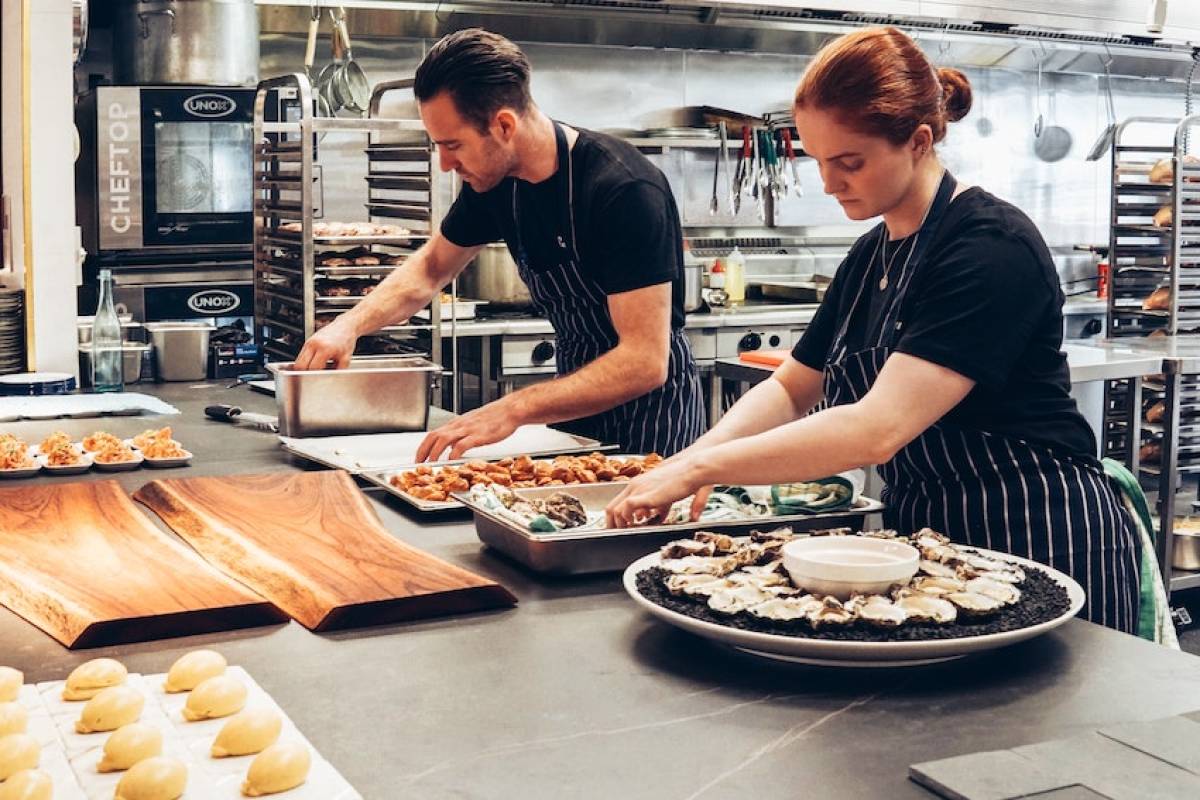How to Build a Strong Kitchen Brigade Team: 7 Tips for Success

A kitchen brigade team is a structured system for organizing a professional kitchen. The system ensures maximum efficiency, productivity, and quality by dividing the kitchen into different stations, each with its tasks and responsibilities.
An effective kitchen brigade team is critical for a professional kitchen's operation and success. The team's ultimate goal is to guarantee the timely delivery of high-quality dishes through the collective effort of all members, each with their specific roles and responsibilities.
As effective as a kitchen brigade system is, implementing it for the first time doesn't come without its challenges.
Factors and Tips to Implement a Strong Kitchen Brigade
Successful kitchen brigades communicate, innovate, and focus on quality and safe. Fostering these will not only help you develop a powerful kitchen brigade, but it can also help you expand your business down the line.
That is not all that is needed to build a strong kitchen brigade.
Here are some of the most significant factors in building a successful kitchen brigade team, along with tips to implement them to build a strong and effective professional kitchen:
1. Establish a leadership
As the head of the kitchen, the chef or sous chef is responsible for setting the kitchen's tone, vision, and goals. They're also in charge of ensuring that everyone is working towards the same objective, typically to provide high-quality food to customers promptly.
Influential leaders should be able to inspire and motivate their team, set clear expectations and goals, and hold everyone accountable for their performance. They can also lead by example, showing their team how to work hard, remain focused, and maintain a positive attitude, even during the most challenging times.
The lead should also confirm that their team members know and adhere to kitchen safety protocols, providing training on safe food handling and equipment operation.
Prioritizing safety and providing ongoing training can cultivate a safe and healthy work environment where everyone performs at their very best.
2. Define roles and responsibilities
In a busy kitchen, every member must know their role and responsibilities to ensure that operations run smoothly. Clear job descriptions for each position, including job expectations and performance standards, sets the team up for success.
You should provide a written job description for each team member, clearly outlining their duties, work hours, and expectations. This way of organizing ensures that everyone understands what the business expects of them.
Clear roles and tasks establish accountability, which is crucial to a practical kitchen brigade team. It prevents mistakes and promotes teamwork, as everyone understands that their actions affect the success of the entire crew.
3. Train and develop their skills
Investing in continuous training and development is indispensable in a rapidly evolving industry. Education helps your brigade acquire new skills and knowledge, improve performance, and stay up-to-date with the latest trends and technologies.
Providing development opportunities also shows that the restaurant values its staff and invests in their professional growth.
You can also consider on-the-job and off-site training, seminars, workshops, and conferences. Providing cross-training opportunities allows the workers to learn and perform multiple functions, making the kitchen more flexible and efficient.
4. Communicate effectively
The kitchen is a fast-paced environment where team members must work efficiently and cohesively to deliver quality dishes to customers. Each team member must communicate clearly and concisely with their colleagues to confirm that everyone can complete tasks quickly.
Effective communication involves not only speaking clearly but also listening actively. You must establish an environment where the team feels comfortable expressing ideas, concerns, and feedback.
The brigade can also use hand signals or eye contact to indicate that they need assistance or that a task is complete. These nonverbal cues can help avoid miscommunication and increase efficiency in the kitchen.
5. Manage conflict
Conflict is unavoidable in the workplace, and a kitchen is no exception. However, effective conflict management can help maintain a positive work environment and ensure the team remains focused on the business goals.
You must train the brigade in conflict resolution techniques and encourage their use when necessary. These methods include active listening, avoiding personal attacks, and finding common ground. Working together to find a mutual benefit solution makes each member feel valued and respected.
6. Encourage creativity and innovation
When team members feel encouraged to share their ideas and suggestions, they become more invested in the restaurant's success and are more likely to contribute. Try to foster an environment where they can express their ideas freely without judgment
Encourage your workers to try out new recipes and techniques and give credit when someone comes up with successful dishes. Using technology and social media can also inspire them. Chefs can follow food blogs and social media accounts to stay up-to-date with the latest food trends.
It's important to note that while encouraging innovation and creativity is critical, it should not come at the expense of quality or consistency. Always thoroughly test and refine any new dishes or processes before adding them to the menu or implementing them in the kitchen.
7. Teach proper time management
Adequate time management guarantees that workers complete tasks on time, deliver orders promptly, and serve customers on time. There are several ways to practice time management in the kitchen.
One way is to prioritize well. Encourage team members to prioritize tasks based on their importance and urgency. With this method, they can do critical duties first, reducing stress and ensuring everything gets done on time.
Proper planning and preparation can also help with time management. Have each member check that ingredients, utensils, and equipment are ready before prep to accomplish orders faster.
In Conclusion
Kitchen brigades are built on teamwork. To building a solid kitchen brigade team, it will require a combination of the aforementioned key factors, including effective leadership, clear roles, and ongoing training and development. With these elements in place, the team can work seamlessly and efficiently to produce exceptional dishes and provide top-notch customer service.
So, make sure you build your kitchen brigade on a strong culture of collaboration, trust, and respect. By fostering this culture, the team can work together seamlessly towards a common goal and create a positive work environment. When everyone believes they are an important and valued member of the kitchen, they will be more likely to perform at their highest level.














![Author-Joyce-Carol-Oats-Featured-Image - [node:title]](/sites/default/files/styles/video_thumbnail_bottom/public/Joyce%2520Carol%2520Oats.jpg?itok=v9GcXRvD)







